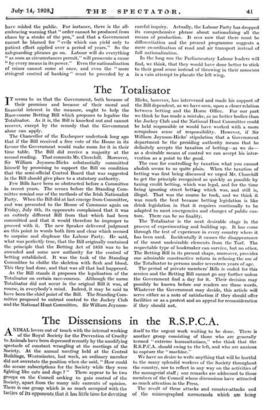The Totalisator
TT seems to us that the Government, both because of -I- their promises and because of their moral and financial interest in the measure, ought to help the Race-course Betting Bill which proposes to legalize the Totalisator. As it is, the Bill is knocked out and cannot recover, except by the remedy that the Government alone can apply.
The Chancellor of the Exchequer undertook long ago that if the Bill received a free vote of the House in its favour the Government would make room for it in their time table. The Bill did receive a majority at the second reading. That commits Mr. Churchill. Moreover, Sir William Joynson-Hicks substantially committed himself by promising to support the Bill on condition that the semi-official Control Board that was suggested in the Bill should give place to a statutory authority.
Few Bills have been so obstructed before a Committee in recent years. The scenes before the Standing Com- mittee remind one of the methods of the Irish Nationalist Party. When the Bill did at last emerge from Committee, and was presented to the House of Commons again on Friday, July 6th, its opponents complained that it was an entirely different Bill from that- which had been committed and that it would therefore be improper to proceed with it. The new Speaker delivered judgment on this point in words both firm and clear which seemed to surprise and displease the Labour Party. He said, what was perfectly true, that the Bill originally contained the principle that the Betting Act of 1853 was to be amended and some new authority for the control of betting established. It was the task of the Standing Committee to clothe the skeleton with flesh and blood. This they had done, and that was all that had happened.
As the Bill stands it proposes the legalization of the Totalisator on certain race-courses. Although the name Totalisator did not occur in the original Bill it was, of course, in everybody's mind. Indeed, it may be said to have been the chief point of the Bill. The Standing Com- mittee proposed to entrust control to the Jockey Club and the National Hunt Committee. Sir William Joynson- Hicks, however, has intervened and made his support of the Bill dependent, as we have seen, upon a closer relation between betting and the Home Office. For our part we think he has made a mistake, as no better bodies than the Jockey Club and the National Hunt Committee could be held responsible or would have worked with a more scrupulous sense of responsibility. However, if Sir William Joynson-Hicks' stipulation that a Government department be the presiding authority means that he definitely accepts the taxation of betting—as we do— as a desirable means of control we can accept his inter- vention as a point to the good.
The case for controlling by taxation what you cannot abolish seems to us quite plain. When the taxation of betting was first being discussed we urged Mr. Churchill to get the principle recognized as quickly as possible by taxing credit betting, which was legal, and for the time being ignoring street betting which was, and still is, illegal. That was the course he took, and we think it was much the best because betting legislation is like drink legislation in that it requires continually to be adapted to meet emergencies and changes of public cus- tom. There can be no finality.
The Totalisator 'is the next desirable stage in the process of experimenting and building up. It has come through the test of experience in every country where it has been used. Incidentally it causes the disappearance of the most undesirable elements from the Turf. The respectable type of bookmaker can survive, but no other. The Betting Bill in its present shape, moreover, provides one admirable constructive reform in refusing the use of the Totalisator to persons under seventeen years of age.
The period of private members' Bills is ended for this session and the Betting Bill cannot go any further unless the Government find a day for it. Their decision may possibly be known before our readers see these words. Whatever the Government may decide, this article will serve either as a note of satisfaction if they should offer facilities or as a protest and an appeal for reconsideration if they should not.




































 Previous page
Previous page